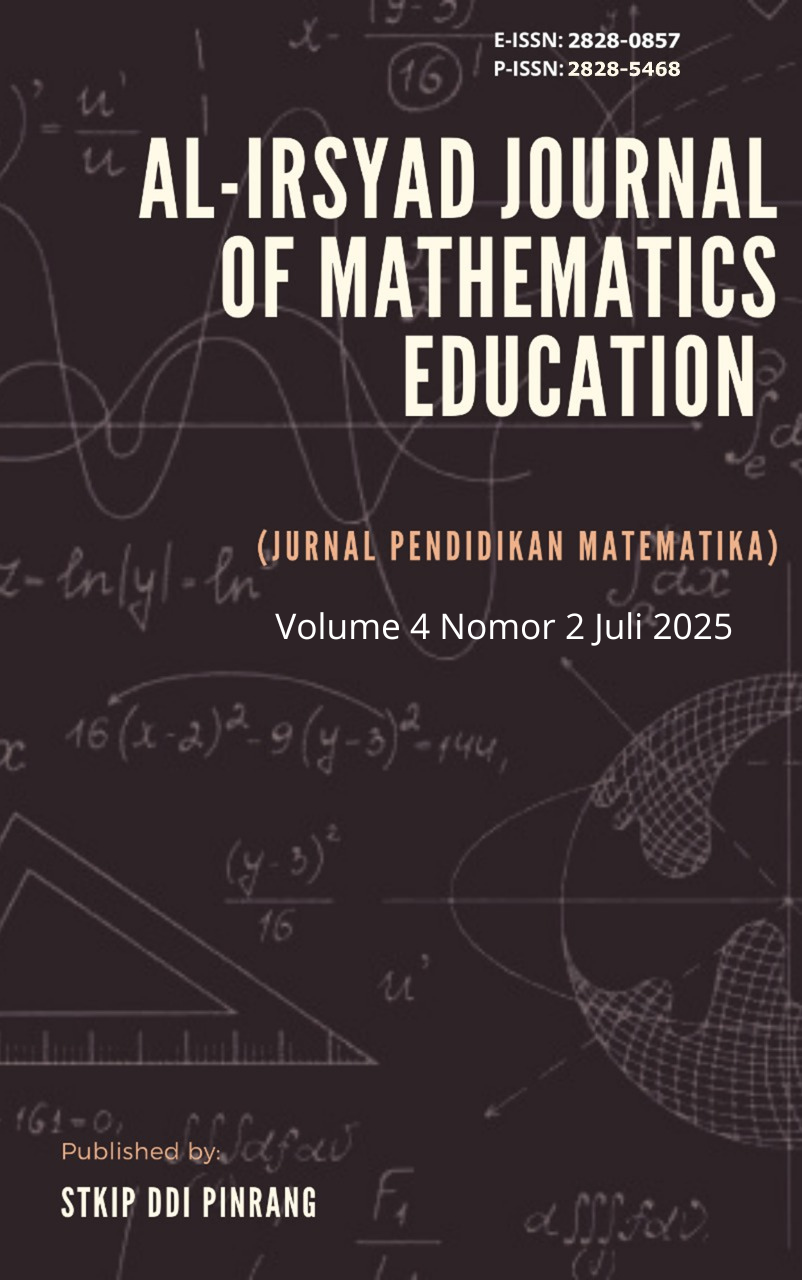MENJELAJAHI POTENSI: MODEL PROJECT-BASED LEARNING DAN PENGARUHNYA TERHADAP KEMAMPUAN PEMECAHAN MASALAH MATEMATIS MAHASISWA
DOI:
https://doi.org/10.58917/ijme.v4i2.317Kata Kunci:
Pembelajaran berbasis proyek, Pemecahan masalah, Pendidikan matematikaAbstrak
Penelitian ini mengeksplorasi potensi model Project-Based Learning (PjBL) dalam meningkatkan kemampuan pemecahan masalah matematis mahasiswa. Penelitian dilaksanakan pada mahasiswa pendidikan matematika di salah satu perguruan tinggi di Pinrang. Metode yang digunakan adalah pre-eksperimen dengan desain one-group pretest-posttest, melibatkan 30 peserta. Instrumen penelitian berupa tes kemampuan pemecahan masalah matematis yang disusun berdasarkan empat langkah penyelesaian masalah menurut Polya. Hasil penelitian menunjukkan adanya peningkatan yang signifikan pada kemampuan pemecahan masalah mahasiswa setelah penerapan model PjBL. Temuan ini menunjukkan bahwa PjBL dapat menjadi pendekatan pembelajaran yang efektif untuk mengembangkan keterampilan berpikir tingkat tinggi serta pengalaman belajar kontekstual dalam matematika. Penelitian ini memperkuat bukti pentingnya penerapan pembelajaran aktif dan berpusat pada mahasiswa, terutama dalam konteks lokal seperti Pinrang.
Referensi
Aldabbus, S. (2020). Project-based learning: Implementation and challenges. International Journal of Education and Practice, 8(3), 379–386. https://doi.org/10.18488/journal.61.2020.83.379.386
Bell, S. (2010). Project-based learning for the 21st century: Skills for the future. The Clearing House, 83(2), 39–43. https://doi.org/10.1080/00098650903505415
Bilgin, I., Karakuyu, Y., & Ay, Y. (2020). The effect of project-based learning on students’ achievement and attitudes towards science. International Journal of Instruction, 13(1), 303–318. https://doi.org/10.29333/iji.2020.13120a
Dole, S., Bloom, L., & Doss, K. (2017). Project-based learning in the flipped classroom: Pre-service teachers’ perspectives. Journal of Education and Learning, 6(2), 234–245. https://doi.org/10.5539/jel.v6n2p234
Doppelt, Y. (2019). Impact of project-based learning on effective integration of ICT in schools. Journal of Science Education and Technology, 28(5), 450–460. https://doi.org/10.1007/s10956-019-09789-6
Han, S., Capraro, R., & Capraro, M. M. (2019). How science, technology, engineering, and mathematics project-based learning affects high-need students in the U.S. Learning and Individual Differences, 74, 101754. https://doi.org/10.1016/j.lindif.2019.101754
Hernández-Ramos, P., & De La Paz, S. (2020). Learning history in middle school by designing digital historical narratives: Effects on engagement and academic achievement. Journal of Research on Technology in Education, 52(3), 321–336. https://doi.org/10.1080/15391523.2020.1726234
Holm, M. (2019). Project-based instruction: A review of the literature on effectiveness in prekindergarten through 12th grade classrooms. Interdisciplinary Journal of Problem-Based Learning, 13(1). https://doi.org/10.7771/1541-5015.1749
Kanter, D. E., & Konstantopoulos, S. (2017). The impact of project-based science on minority student achievement, attitudes, and careers: The effects of teacher content and pedagogical content knowledge and inquiry-based practices. Science Education, 94(5), 855–887. https://doi.org/10.1002/sce.20391
Kilpatrick, W. H. (2021). The project method: The use of the purposeful act in the educative process. Educational Foundations, 34(2), 77–90. (Reprint from original 1918 publication)
Lee, H., & Lim, C. (2021). Promoting student engagement through project-based learning: A meta-analysis. Asia Pacific Education Review, 22(2), 173–187. https://doi.org/10.1007/s12564-020-09654-0
Mergendoller, J. R., Maxwell, N. L., & Bellisimo, Y. (2021). The effectiveness of project-based learning in high school economics. Journal of Research on Educational Effectiveness, 14(1), 32–51. https://doi.org/10.1080/19345747.2020.1794622
Nguyen, T. T. H., & Nguyen, T. Q. (2022). Effects of project-based learning on students’ learning achievement in mathematics: A meta-analysis. Journal of Mathematics Education, 15(2), 118–130.
Polya, G. (1957). How to solve it: A new aspect of mathematical method (2nd ed.). Princeton University Press.
Putri, R. I. I., & Zulkardi. (2018). Etnomatematika: Konteks budaya dalam pembelajaran matematika. Jurnal Pendidikan Matematika, 12(2), 193–208.
Sari, N. W., & Nugroho, S. E. (2020). Penerapan model project-based learning untuk meningkatkan kemampuan pemecahan masalah matematika. Jurnal Pendidikan Matematika Indonesia, 5(1), 13–20.
Sugiyanto, & Surya, E. (2021). Pengaruh project based learning terhadap kemampuan pemecahan masalah matematis siswa. Jurnal Pendidikan Tambusai, 5(1), 2101–2107.
Suryani, I., & Setiawan, D. (2019). Meningkatkan kemampuan pemecahan masalah matematis melalui pembelajaran berbasis proyek. Jurnal Pendidikan dan Pembelajaran Matematika, 10(2), 94–100.
Thomas, J. W. (2000). A review of research on project-based learning. The Autodesk Foundation. Retrieved from http://www.bie.org/index.php/site/RE/pbl_research/29
Widodo, S. A., & Nurhayati, I. (2021). Improving students' mathematical problem-solving ability through project-based learning. International Journal of Instruction, 14(1), 445–460. https://doi.org/10.29333/iji.2021.14126a
Yuliani, K., & Hartanto, S. (2020). Pengaruh project-based learning terhadap hasil belajar matematika siswa sekolah dasar. Jurnal Pendidikan Matematika Dasar, 5(2), 95–104.
Unduhan
Diterbitkan
Cara Mengutip
Terbitan
Bagian
Lisensi
Hak Cipta (c) 2025 Abdul Hakim Junaid, Iqbal Mukaddas, Hariady

Artikel ini berlisensi Creative Commons Attribution 4.0 International License.






















